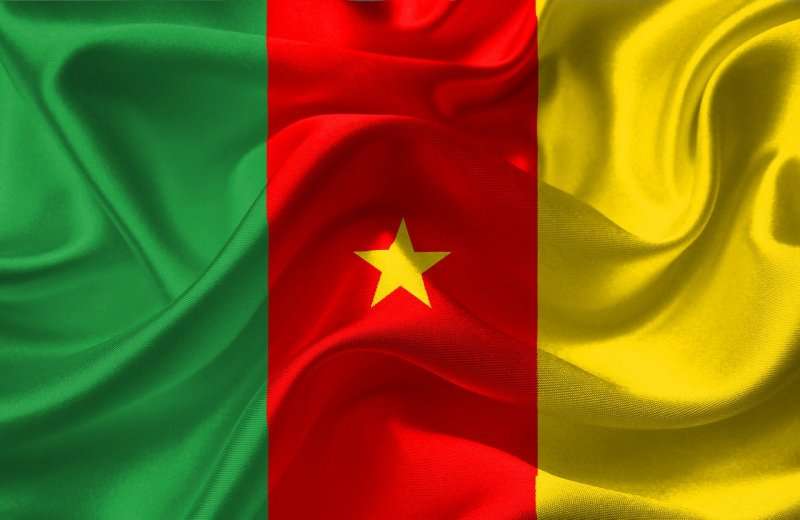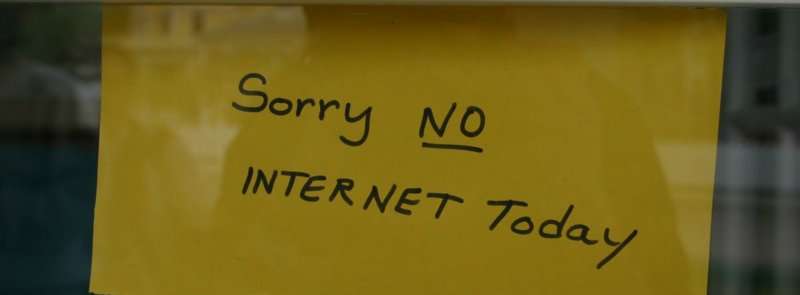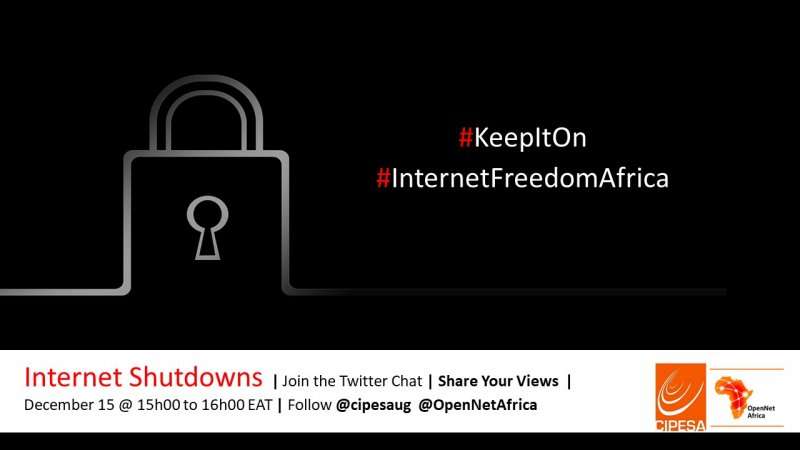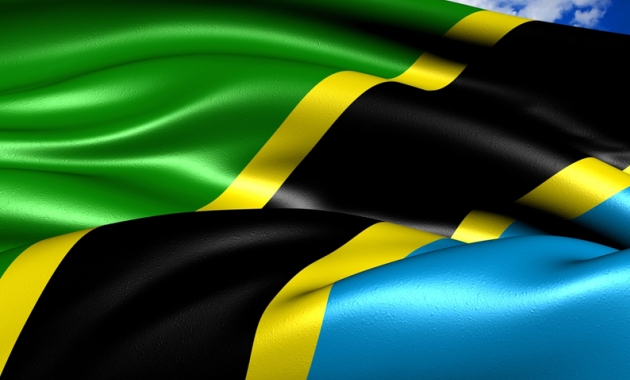By Juliet Nanfuka |
The pushback against internet shutdowns in Cameroon has recently taken a new turn with advocacy organisations filing formal submissions before the Supreme Court of Cameroon. In their January 2018 submission, AccessNow and Internet Sans Frontières (ISF) highlight Cameroon’s commitment to international and regional human rights law and urge judges to recognise that disrupting or blocking the internet is incompatible with the right to free expression and access to information.
Authorities in Cameroon first initiated an internet shutdown in the English-speaking regions on January 17, 2017, which lasted 93 days. The shutdown was imposed in the wake of ongoing strikes, fatal violence and protest action against the continued “francophonisation” and marginalisation of English speakers who claim the central government “privileges the majority French-speaking population and eight other regions.” Cameroon’s constitution recognises the two languages as equal and calls for bilingualism. A second shutdown was effected on October 1, 2017 and some 150 days later, there was still no sign that the shutdown is about to be lifted in the affected Anglophone regions of Southwest and Northwest Cameroon.
The case in which AccessNow and ISF intervened is one of two ongoing cases challenging the January 2017 shutdown. Initiated in April 2017 by Cameroon’s Veritas Law Offices, in collaboration with the Media Legal Defence Initiative (MLDI), the cases are against the Ministry of Post and Telecommunications, Cameroon Telecommunications (CamTel) – a private company which dominates the telecoms sector in the country – and the Government of Cameroon.
Litigation has been recognised as a potentially effective tool in removing restrictions on the free flow of information online in countries with repressive internet regimes. Increasingly, various initiatives are seeking to encourage collaboration across different internet governance actors in strategic litigation for a free and open internet.
AccessNow and ISF’s filing seeks remedy for the shutdown, calling it a violation of citizens’ constitutional rights to freedom of expression and access to information and freedom from discrimination. Indeed, in the submission, the organisations point out that international and regional courts as well as human rights institutions have condemned shutdowns as contrary to the law, unnecessary, and a disproportionate means of achieving their aim.
The filing also to refers to Article 19(3) of the International Covenant on Civil and Political Rights (ICCPR) and Article 9 and 27(2) of the African Charter, which state that a limitation or restriction on the right to freedom of expression will only be justifiable where it is (i) provided by law, (ii) serves a legitimate interest, and (iii) is necessary in a democratic society. These articles further state that where a state’s restriction or limitation fails to meet any one of the aforementioned criteria, it will amount to a violation of the right to freedom of expression.
Meanwhile, in November 2016, the African Commission on Human and Peoples’ Rights adopted a Resolution in which it expressed its concern over “the emerging practice of State Parties of interrupting or limiting access to telecommunication services such as the Internet, social media and messaging services, increasingly during elections”. It urged state parties “to respect and take legislative and other measures to guarantee, respect and protect citizens’ right to freedom of information and expression through access to Internet services.”
Various countries in Africa, Europe and Asia have experienced various forms of internet disruptions in recent years, some repeatedly like DR Congo, Ethiopia, India, Turkey, and Uganda, often with little legal recourse available to citizens. In the few instances where redress has been sought through courts of law, the proceedings have been slow such as the case of Uganda which called for the 2016 social media and mobile money shutdowns to be classed as illegal in a bid to deter a repeat of similar actions. Indeed, litigation is offering a new frontline in digital rights, such as in the case of the Gambia following the February ruling by the Economic Community of West African States (ECOWAS) Regional Court of Justice that media laws on sedition, false news and criminal defamation violate the right to freedom of expression. This mirrored the 2015 ruling by the East African Court of Justice (EACJ) which ruled that sections of Burundi’s Press Law of 2013 violated press freedom and democratic principles called for them to be repealed.
Nonetheless, the push for digital rights has taken on different forms and strategies, including the popular #KeepItOn campaign which is creating greater awareness and pushback against internet shutdowns. In Africa, for as long internet disruptions continue to recur, more strategic responses to them need to be developed particularly as sinister measures such as ambiguous regulations are increasingly taken to control the flow of information and freedom of expression online.
Update: Internet Access in the affected regions of Cameroon was restored in early March 2018.
CIPESA Submits Comments On The Uganda Data Protection and Privacy Bill, 2015
Official Submission |
Article 27 of Uganda’s constitution provides for citizens’ right to privacy, however, there is no law to protect an individual’s data privacy despite the large amounts of citizen data collected by government departments and private entities on a regular basis. More concerning, is that this data is collected with no guarantee of its protection and privacy.
Some existing legislation, for instance the Computer Misuse Act, 2011 (section 18); Access to Information Act, 2005 (section 26); Uganda Communications Act, 2013 (section 79); Electronic Signatures Act, 2011 (section 81); and the Regulation of Interception of Communications Act, 2010 (section 2) prohibit unauthorised access and disclosure of information. However, the provisions in these laws are not elaborate and do not adequately protect personal data.
The publication of the draft Data Protection and Privacy Bill 2014 was therefore a milestone. Accordingly, the Collaboration on International ICT Policy for East and Southern Africa (CIPESA) submitted comments to that version of the bill. Various concerns were raised including vague wording which left the bill open to misinterpretation, unclear procedural processes for collection and retention, as well as the costs associated with accessing personal data.
More recently on , CIPESA welcomes the Parliament of Uganda’s call for submissions on the Draft Data Protection and Privacy Bill, 2015. It once again gives opportunity for stakeholders to provide input to ensure that the law, when enacted, measures up to internationally acceptable standards of data protection.
In our latest submission, we highlight some of the positive principles and provisions of the Bill. Furthermore, we indicate areas of concern and suggest amendments to ensure that if the bill is passed into law, there are sufficient safeguards to regulate the collection, storage and use of data towards upholding citizens’ right to privacy.
See the full submission made on the Uganda Data Protection and Privacy Bill, 2015 presented to the Committee on Information and Communication Technologies (ICT) in the Parliament of the Republic of Uganda
With the sheer amount of data – including personal data – that #Uganda citizens are sharing, it is NB to have a well crafted law to safeguard this data!
See our comments on the #Uganda #DataProtection #DataPrivacy bill 2015 -> https://t.co/Clf5jvfK5j pic.twitter.com/SQmeVFyMwn
— CIPESA (@cipesaug) February 15, 2018
Disruptions To Digital Communications Persist In The Democratic Republic Of Congo
By Edrine Wanyama |
Internet access and Short Message Services (SMS) were interrupted in the Democratic Republic of Congo (DR Congo) on January 20, 2018 ahead of a peaceful protest march organised by the Catholic Church to compel President Joseph Kabila to step down following the expiry of his final term in office. The country remains caught in a cycle of instability since the postponement of the November 2016 elections to December 2017, and then to April 2018.
The first interruption of digital communications in the vast central African nation occurred in December 2011 in the aftermath of general elections, before the announcement of the election results. The shutdown affected SMS, and lasted 25 days.
In the seven years since then, DR Congo has experienced at least five communication disruptions amidst growing concerns about surveillance of the digital communications of opposition leaders, journalists, and activists.
Affronts to internet access hurt human rights, and undermine political stability and economic growth. According to the new framework for calculating the economic impact of internet shutdowns, DR Congo loses at least USD 1,936,911 per day of an internet disruption.
The regular communication disruptions bring into focus the role of intermediaries in advancing internet freedom in the country. Specifically, telecom companies and other Internet Service Providers (ISPs) are being challenged to dissociate themselves from censorship, by declining to effect the government’s orders to cut off communications. Such a move would arguably be in accordance with the UN Guiding Principles on Business and Human Rights which require businesses to proactively address all adverse human rights impacts directly linked to their operations, products or services. However, many telecommunications services providers fear reprimand and termination of their licences for failure to comply with directives from the state to interfere or block digital communications.
Government directives to shut down the internet or interrupt communications are usually issued under the guise of “national security” or “public order”. In a letter ordering network disruptions in August 2017, an official of the national communications regulatory body, the Autorité de Regulation des Postes et Télécommunications du Congo (ARPTC), instructed service providers to take preventative measures to reduce the capacity to transmit “abusive messages.”
Internet penetration in DR Congo remains low at 4.2%, supported by a 55.7% mobile penetration. To-date, there are two primary laws governing the telecommunications sector, both of which were passed in 2002: the Framework Law 013/2002 on Telecommunications, and the Law 14/2002 on the Regulations – the law that established the national regulator. However, rather than advance internet access and usage, these laws have often been used against the media and critics of the state. Meanwhile, there are limited meaningful avenues for citizens to provide inputs to proposed new laws related to the telecommunications industry.
President Kabila’s government should boldly work to stop the abuse of rights which the country’s 2005 constitution guarantees . Abuse of free expression and access to information has continued in Congo despite the recognition of access to the internet as a human right by African and International Human Rights instruments. The UN Secretary General has previously called and continues to call upon the Congolese government to uphold her citizens’ freedoms to speech and peaceful assembly.
It is thus imperative that Congo government authorities desist from interrupting digital communications and guarantee citizens’ access to the internet and to the full enjoyment of their digital rights. Further, the Congo government should recognise the relationship between access to the internet and citizens’ livelihoods and work to grow the number of its citizens that meaningfully access and use digital tools and services.
Online Chat On Internet Shutdowns
Online Chat |
On Friday December 15, 2017, the Collaboration on International ICT Policy for East and Southern Africa (CIPESA) will spend some time sharing insights on internet shutdowns. Between 15h00 and 16h00 East African Time (EAT) we will explore the spate of shutdowns affecting Sub-Saharan Africa and the efforts to navigate them.
Have you experienced an internet shutdown? Are you experiencing a shutdown? What work or insights would you like to share around this issue? What is the way forward?
We will also share insights on the economic impact of internet shutdowns with reference to a new framework we developed on calculating the Economic Impact of Internet Disruptions in Sub-Saharan Africa
A few of the documented cases of deliberate interruption of digital communications in sub-Sahara Africa in December thus far include an ongoing shutdown in Anglophone regions of Cameroon which as of today has run for 75 days. An earlier shutdown in the same region lasted 93 days. This week also Ethiopia experienced interruptions to its communications – primarily Facebook, Whatsapp and Twitter due to protests in the Oromia region. Further afield, in Yemen, there were reports of some internet filtering, blocking, throttling, and social media shutdowns.
Join the discussion and share your views on how we can #KeepItOn and protect #InternetFreedomAfrica
Analysis of Tanzania’s Electronic and Postal Communications (Online Content) Regulations 2017
Policy Brief | The proposed Electronic and Postal Communications (Online Content) Regulations, 2017 join the catalogue of legislation related to online content in Tanzania that threaten citizens’ constitutionally guaranteed rights to freedom of opinion and expression and the right to seek, receive and impart information. The regulations were developed pursuant to section 103(1) of the Electronic and Postal Communications Act, 2010 (EPOCA), which empowers the Minister of Communications to make regulations on content related matters. Enacted in March 2010, the EPOCA aims to keep the communications sector abreast with developments in the electronic communications industry by providing for a comprehensive regulatory regime for electronic communications and postal communications service providers.
The regulations specify obligations of service providers and users of online platforms including social media, discussion forums, and online broadcasts (radio and television). They also confer powers upon the Tanzania Communications Regulatory Authority (TCRA) to regulate online content, including through registration of users and platforms, and taking action against non-compliance with the obligations, such as ordering the removal of “prohibited content.”
The regulations have some important provisions and set minimum standard requirements with regards to the protection of children online, fighting hate speech and extremism online, and promoting user responsibility and digital security practices. However, the regulations should to reviewed and amended to have clear, unambiguous definitions and wording, and quash the requirement for registration of bloggers and users of similar online platforms. It is also essential that not too much power is vested in TCRA with regards to content take-downs and that diversity in content availability online is promoted. The obligations set out should not turn content service providers and publishers into monitors, by handing them responsibility such as use of moderating tools to filter content, conducting content review before publication, and undertaking mechanisms to identify sources of content.
Moreover, there should be a clear appeal mechanism against orders to remove or block content, and such remedial measures should also be applicable once an order for blockage or removal has been issued but not yet been effected. Overall, the regulations should uphold citizens’ rights to privacy, access to information and free expression. Furthermore, TCRA, pursuant to EPOCA’s objectives of promoting a developed telecommunications sector in Tanzania, should ensure that the regulations foster internet access and affordability without placing undue requirements on service providers or making costs prohibitive, which would act as a barrier to market entry, including for public access facilities such as internet cafes.
Read CIPESA’s analysis of the implication on access to the internet, intermediary liability, user privacy, censorship, surveillance and freedom of expression of the proposed regulations in Tanzania.





